'Men of the calibre of Shri Ramana Maharishi, Satya Sai Baba, Shri Aurobindo -- you don't get that level of excellence in the West.'
'The quality of Indian saints is unmatched.'
Bill Aitken came to India nearly 60 years ago. He never returned.
An Indian citizen since 1972, he speaks to Rediff.com's Archana Masih about finding a religion, a country and discovering India on steam engines and motorbikes.
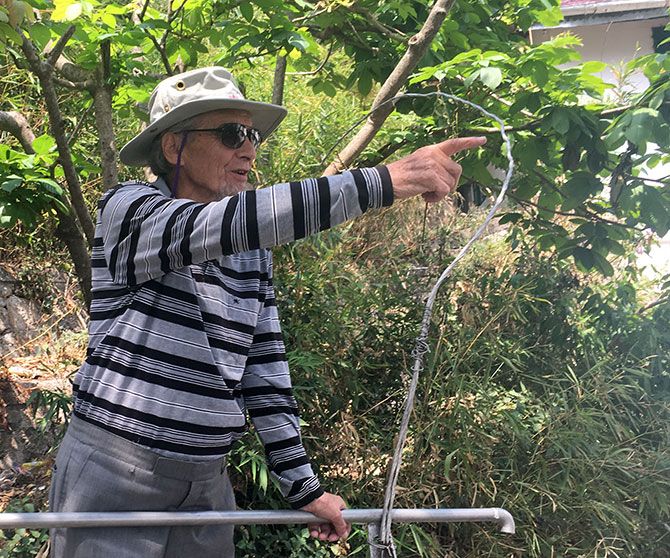
If there is a journey of a lifetime, then Bill Aitken made one 58 years ago.
At 25, he set out over land, from England to India with 50 pounds (around Rs 1,000 in today's time).
Six weeks later, on September 7, 1959, he arrived in India, crossing over from Pakistan through Wagah after hitching a ride for Rs 2 with a group of British tourists he had met in the Kwality restaurant in Lahore.
"The funny thing was I happened to be born a vegetarian. At Christmas dinner, I would have a boiled egg!" says Bill Aitken, 83, with a generous laugh and a youthful, age-defying manner of speaking.
He gave up his British passport and became an Indian citizen in 1972. The procedure included placing an advertisement in Hindi in the local newspaper Almora Shakti.
"I had always gravitated towards Hindustani values. I studied the world's living religions at the University of Leeds and had planned to go around the world to see Buddhism, Hinduism... I was young, I was free... I thought it is now or never."
He is sitting in a chair under an assortment of framed pictures on the wall, recuperating from knee surgery. It is comfortably warm in the 100-year-old cottage in Mussoorie where every article seems of vintage.
Among the photographs is a picture of his companion of 40 years, the late former Maharani of Jind and another one of his guru Shri Krishna Prem.
A World War I fighter pilot, Shri Krishna Prem, an Englishman, had a degree in philosophy from Cambridge. He came to teach at Lucknow university in the 1920s, became a sadhu and lived his life in an ashram in the Himalayas.
The easy, riveting conversation of journeys, gurus, people and life in an India of a different time is only broken by the hourly chimes of the cuckoo clock and honks of cars on the winding road outside.
Listening to him, if there is one thought that succinctly describes his experiences, it is this -- 'Wow, what a life this man has lived!'
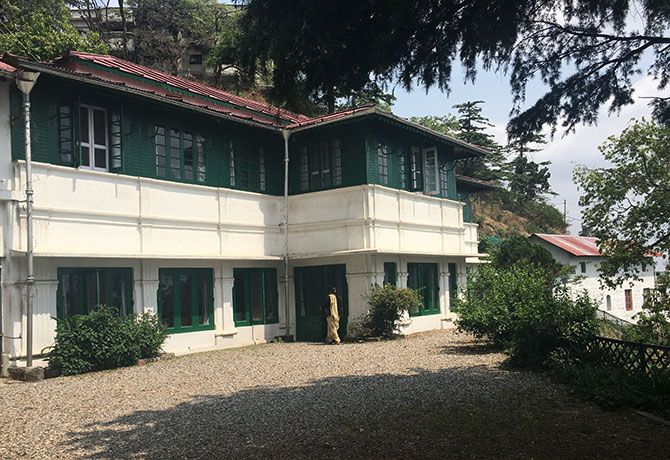
Long before the days of Google, Aitken's only source of information to plan the overland passage to India were a few books.
Luckily, conflict and strife had not made geographical borders and certain countries as inaccessible as they are today. Yet when has there ever been a time when the world has been at peace?
En route he wanted to stop in Israel to see the Holy Land, but the battle for the supremacy over the Suez Canal had made it impossible to travel through the Arab countries.
"You could only sail to Jaffa through Syria or Jordan, but because of the Suez war the British government said you can't get a visa to Syria."
A friend who had already done the trip to Israel told him to ignore the advisory.
"He told me to just apply for a Syrian visa when I got to Turkey. 'If you have the cash, you will get the visa', he said and that was enough to set me off visa-less for Ankara," he says in a conversation liberally sprinkled with chuckles as he digs out gem after another.
He finally did get the visa.
Among the cluster of photographs in the room where Aitken, a master raconteur, is recounting his adventure, is a scrapbook with a map showing the route of the journey, highlighted in black.
England-Belgium-Luxemburg-Germany-Austria-Croatia-Serbia-Macedonia-Greece-Turkey-Syria --Lebanon-Jordan-Israel-sail back to Turkey-Iran-Pakistan-India.
He rattles off the countries with ease, its thrill still undimmed by the distance of memory.
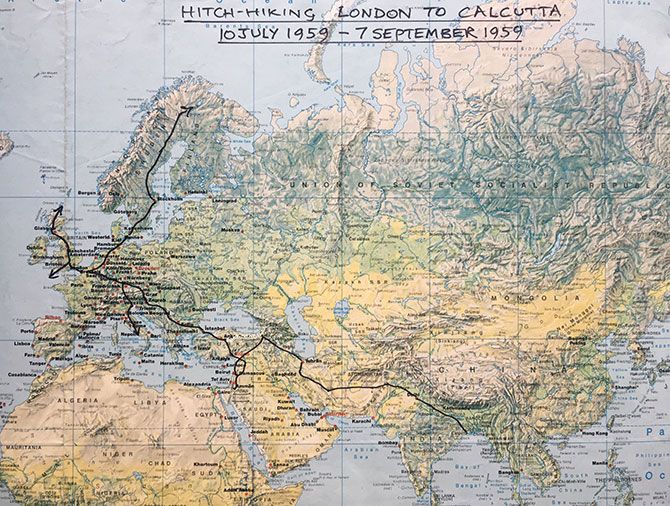
"I journeyed by road/train... in anything that got me further. When I got to Yugoslavia the cars and roads ran out. Student volunteers were building roads under Marshal Tito and there were huge posters on the highways, saying, 'Marshal Tito loves you, please build his roads'."
"Wonderful people, the Yugoslavs."
But the highlight of the journey came in Iran -- when he was booted out of the mosque in Qom.
"I had travelled with pilgrims on a bus and went in along with them, but I was physically thrown out. The Shah of Iran was still ruling then and it was used by the Ayatollah (Khomeini) as a seminary. He wasn't there at that time," he laughs heartily again, sipping a glass of warm water.
It was a different world then -- Yugoslavia had not broken up, the Shah had not lost his throne and Pakistan was under martial law.
"I made it to India, god knows how," he chuckles, remembering that Wagah was a quiet crossing at that time without the masculine theatre that is played out between Indian and Pakistan every evening.
He caught a train to Amritsar to visit the Golden Temple and then onward to Delhi where he stayed at the Birla Mandir, which was inaugurated by Mahatma Gandhi with the condition that it should be open to people of all castes.
But by then he was broke. "50 pounds khatam ho gaya, even though I had survived on grapes and bread to make it last," he laughs.
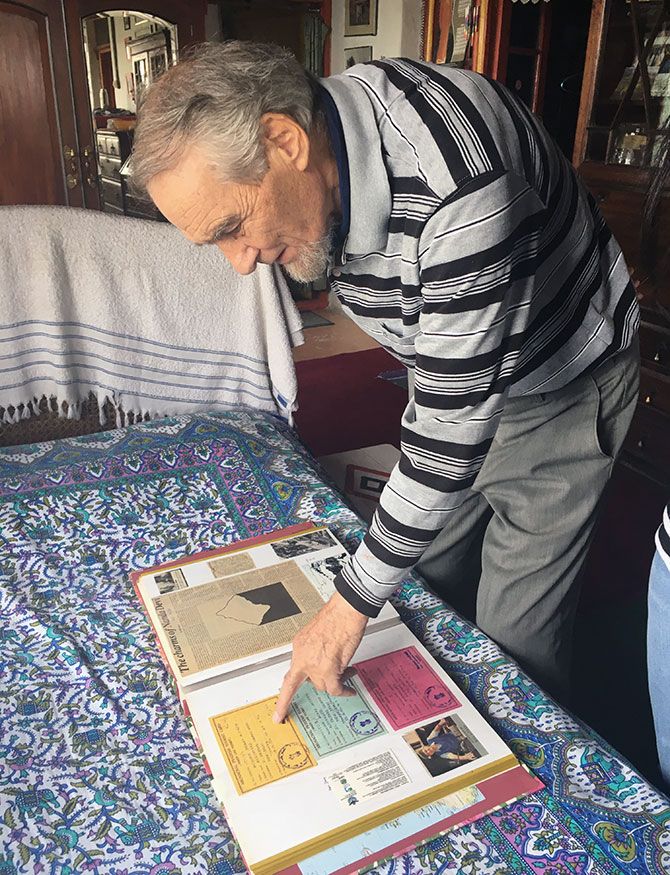
A friend in Calcutta then got him a teaching job for Marwari kids at the Hindi High School for Rs 400 a month -- and Aitken set off by train to Bengal for another life-changing journey.
He taught for one-and-a-half years and lived at the Salvation Army hostel for Rs 1 a day.
"The only Christians that I've found, who actually practice what Christ was all about!" he says in good humoured jest. "if I had any money I would leave it to them. They are simple and sincere."
Last year an old student from the school, now a CEO of a large company, sought him out and invited him for lunch.
He loved Calcutta and the people. They were so themselves -- so at home in their own culture, he felt. "They gave a hoot about anyone else. Most people when they saw an angrez, they appeared polite and helpful, Bengalis just laughed at you," he says with a laugh himself.
"It was so refreshing that I was a figure of fun."
With an MA in comparative religion, Aitken's plan was to experience the religions of the world and return to England to teach -- but the Hindi High School changed it all for him.
"What turned me, having grown up in the Western education Scottish Calvinist faith, was this wonderful image of Saraswati at the entrance."
"It was mind blowing. I stayed on because of Goddess Saraswati. That really decided that India complements my thinking. The psychic -- this more than the body dimension -- was totally lacking in the West."
As he says this, he points to a statue of Saraswati, the Goddess of Learning, placed in a shelf opposite the chair he is sitting in. It seems to be thoughtfully placed, to be in front of his eyes at most times.
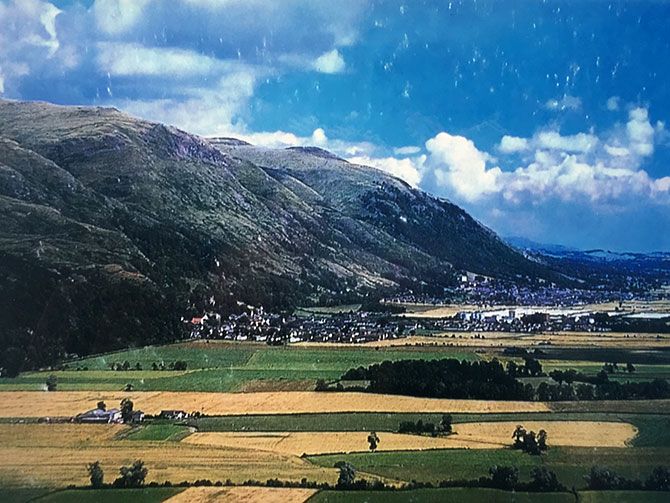
Bill Aitken has been a student of Hinduism since 1953. His scholarship has been honed by half a century's experience of witnessing and encountering the spiritual and the divine in India.
He spent 11 years in two ashrams in Uttarakhand in the 1960s, working as a gardener and labourer. An almost fatal bout of typhoid nearly took his life there, but he came out of it semi enlightened, he says.
"We are not born with religion, we are born to find our religion," says the man who has visited all the dhams (religious destinations) and harbours an innate sensitivity towards India's mountains, forests and rivers.
He has written over a dozen books travelling through the country on his motorbike and trains.
For twelve years, every winter, he set out of Delhi on his motorbike to the Deccan and says the most beautiful mandir he has ever seen is the 13th century Ramappa temple in Telangana.
"Those living, vibrant statues... I never tire of the Deccan -- the temples, the legacy of the Maratha empire, the brilliant architecture of medieval Muslim sultanats in Bidar, Bijapur -- fantastic!"
Historian Ramchandra Guha once said in an interview that Aitken's book Seven Sacred Rivers is a gem of a portrait of India.
"As a child I was very dissatisfied about the nature of the divine god," says Aitken. "Whenever I questioned my elders, the answer always was -- 'eat your bun'," he laughs.
"Only as a student, after I read these various world scriptures, immediately, the Upanishads made sense."
"India finds worship as a natural thing to do. In Shakespeare's England there was still a psychic dimension, but with the Age of Reason in the 17th-18th century, the psychic reality -- like the credence to dreams and premonition -- was cut out. It all became cerebral."
"Men of the calibre of Shri Ramana Maharishi, Satya Sai Baba, Shri Aurobindo -- you don't get that level of excellence in the West. The quality of Indian saints is unmatched."
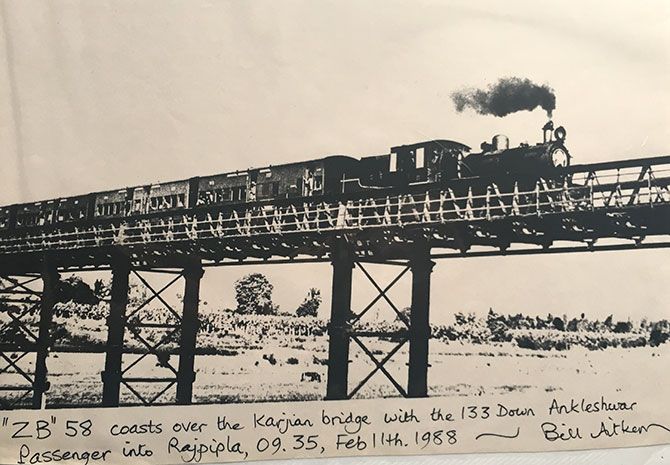
Aitken once wore a kilt. His native village has a monument to Scottish hero William 'Braveheart' Wallace, the iconic martyr of Scottish independence.
His painstakingly made scrapbook -- which has photographs, travel memorabilia like the first -ever tourist permit to Arunachal -- has a section devoted to Tullibody, his village in the Forth Valley.
It has photographs of his family, a picture of an old Scottish steam engine and his beautiful village -- but Aitken has left Scotland far behind.
He last visited his sisters in 1997 and does not think he will make another trip.
When he took Indian citizenship, he wrote to the British high commissioner renouncing his British citizenship -- and the reply he got was -- 'you can't!'
"I was informed that because you are born in Britain of British parents you remain British whether you like it or not," he laughs.
"So I'm Hindustani and Vilayati."
"I love India. Britain has no appeal, I like the people, but it is a strange place. I feel it is an unenlightened well meaning nation. They gave me a good education and I can never thank them enough."
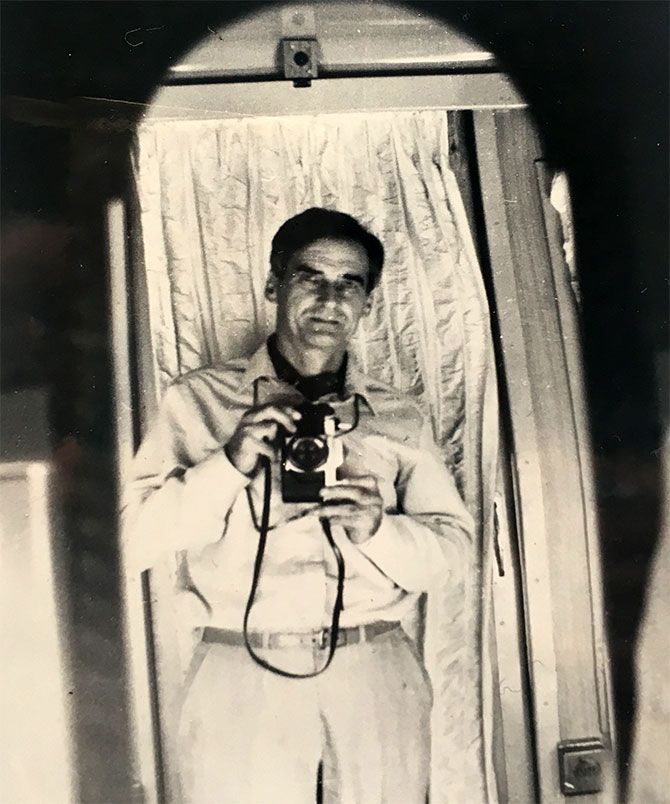
Fired by that education's encouragement to question beliefs and ideas ultimately led Aitken to India.
In England, his external examiner for the MA thesis happened to be a Bengali. The professor told him that if he ever happened to visit India, he should meet Shri Krishna Prem, the English sadhu in Mirtola ashram in Almora.
In the strange ways fate sometimes goes on to craft people's lives, it was a stroke of chance that the teacher from whom Aitken was taking Sanskrit lessons in Calcutta, also knew Shri Krishna Prem.
But he warned him that the guru did not like visitors and gave him a letter of introduction.
Aitken would only meet the guru a few years later, but like most of his journeys, his move from Calcutta to the Himalayas was yet another fascinating discovery of India, her people and of himself.
- Part 2 of the interview: 'India is a superior civilisation'











 © 2025
© 2025